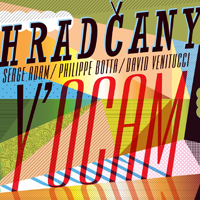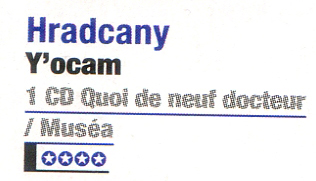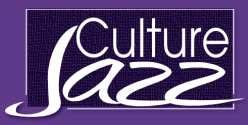Y'ocam - Press

HRADCANY Y'ocam - Press |
 |
Some music is meant to be danced to, it gives you pins and needles in the legs and knocks you out of your chair. Hradcany's music does much more: it’s not only music to dance to, but music that dances! Rhythm that splits for a few seconds, an, ornament that blossoms into an ending phrase and suddenly we hear an entrechat, a leap, a spin…. From the Northern Carpathian mountains to Turkey, music from a mass of different cultures grazes, influences, turns around each other... It's from these various sources that Serge Adam, David Venitucci and Philippe Botta are nourished. For fifteen years now, they make up their own traditions, compose in reference to one or the other, travel, marveling in the crescent that extends from Eastern Europe to the Ottoman lands. Thus, their music is infinitely diverse. |
Or sometimes it is more Balkan, it links asymmetrical steps, superimposed melodic fragments that respond from one floor to another. The trumpet or the accordion alternatively give the rhythm of the structure, and each one in its turn flies in a whirlwind solo. But despite the instrumentalists’ personality and virtuosity, it's the overall sound that we’re drawn to : this unique and warm mixture, these three breaths that twine and interweave to give us this bouquet that we recognize. And what a pleasure to enter into a universe so complicated! The complex meters, the woven virtuosity, the sound tampering follow each other...and yet it sounds easy! This music that is so difficult to play delivers without reluctance and without restraint: we go there with simple and delicious pleasure. Yvan Amar (09-2017) |
||
Hradčany is a child of the century. For more than fifteen years, the trumpeter Serge Adam and his two companions have invested in a music that takes its ease near the castle of Prague but shines on Central Europe and even pushes its visits to the gates of the Bosphorus, where the mixing has rendered obsolete the clear boundaries between Europe and Asia. It is a modern repertoire which nevertheless sings the memory of the greatness of the rival Empires, the Ottoman and the Austro-Hungarian. Evidenced by the very sweet "Besh Yildan Sakkiz" where David Venitucci's accordion plays with oriental modes by galvanizing the timbre of the trumpet. It is a folklore which, if it is not entirely imaginary, is perfectly fantasized and offers armfuls of contemplation and wandering, starting with "Hej", at the very end of the album, when François Verly comes exceptionally to add his daf to a trio without percussion. Strolling around in the music of the Balkans and their surroundings without drums but with trumpet, the challenge may seem very daring. |
However, “Thrace – Kimerit Bacalari Nasti Usava” demonstrates, as has always been the case, that Hradčany does not need percussion to dance and make people dance. The accordion blows bass as much as it blows embers and structures a very horizontal writing where Philippe Botta's saxophone responds to the trumpet in a desire to stun the subject and the listener as after a soft waltz. Hradčany likes to make people dance without stopping to think. Y'OCAM is a manifesto for cosmopolitan music that causes the lower back to waddle, but without particularly pushing to trance. Everything is insinuated gently, with a lot of poetry and that little touch of nostalgia that still hangs around the foothills of the Czech capital and that often warms the old damp stones and the hearts of marauders. Hradčany is a canaille and joyful music, like the districts of Prague that the orchestra embodies. Franpi Barriaux / Publié le 18 mars 2018 |
 |
|
|
 |
Nouveauté. This trio brings together Serge Adam (trumpet), Philippe Botta (saxes, fl ney), David Venitucci (acc) around original music very openly inspired by the musical area extending from the Balkans to Turkey. For fifteen years they have been exploring its resources and perfecting this way of appropriating them and opening them up to this profession of arranger and improviser which makes the difference with a multitude of neighboring companies jostling on this niche. |
|
Serge Adam, Philippe Botta, David Venitucci are passionate, fascinated by Balkan music. They are inspired by it in their trio... of experts! > Quoi De Neuf Docteur - DOC 081 / Musea ; Believe Digital, Les Allumés du Jazz |
 |
|||
|---|---|---|---|---|---|
|
|||||
Jan Hocek Hradčany: Y´Ocam4. 12. 2017 Počátkem roku jsem tady recenzoval desnosovský projekt tria Serge Adam/Tania Pividori/Christelle Séry (zde); netrvalo dlouho, a francouzský trumpetista a skladatel Serge Adam vyrukoval s novinkou jiného tria, a to s navýsost sympatickým názvem Hradčany. V pořadí již čtvrté album tohoto souboru se zove Y´Ocam... Jazzový experimentátor Adam založil Hradčany v roce 2000, okouzlen návštěvou Prahy a také zasažen balkánským folklórem; pravděpodobně mu takový název připadal vhodný (není jediný, kdo Čechy řadí k Balkánu). Onu fúzi balkánské hudby (s vlivy hudby řecké a turecké) s volnou improvizací nazývá autor většiny repertoáru Hradčan imaginárním folklórem. Spolu s ním jej hrají akordeonista David Venitucci (ex- Renaud Garcia-Fons, Denis Leloup, Norma Winstone atd.) a Philippe Botta, saxofonista a flétnista, pohybující se napříč alternativními žánry (od experimentálního rocku přes free-jazz až po world-music). Osmačtyřicetiminutová stopáž, rozčleněná do osmi kompozic, naplno ukazuje, že se dá vyhnout určitému stereotypu, do kterého podobně zaměřené soubory často upadají. Každá skladba je postavena na svébytné energii a aranžérské nápaditosti, jež takto nesplynou, a tudíž nezačnou po nějakém čase nudit. Nejsou ani zbytečně protahovány; každý ze tří instrumentalistů ví, kdy má přestat. Proto jsou jejich improvizovaná sóla součástí hudebního procesu, jsou stavebními prvky kompozice, netváří se být něčím víc, a už vůbec nejsou samoúčelnými exhibicemi či soutěžením, kdo víc, líp, rychleji, divočeji. Hned úvodní Adamova skladba Thrace, spojená s coververzí jednoho dílka Selima Seslera, předčasně zemřelého tureckého klarinetového virtuóza romského původu (1957-2014), má v sobě nápaditou a patřičně výbušnou směs tří výrazně frázujících, mírně posunutých hlasů, z nichž se nakonec vyloupne omamně orientální melodie. Barevnost, s níž se propojují akordeon, trubka a saxofon (v tomto případě sopránka), je vzrušující. V následující Accordion Pride se k sopránce přidává také tenorsax, jenž s akordeonem nádherně probublává. Rychlé tempo se střídá s pomalým, trubka free-jazzově bouří. Titulní Y´Ocam (což značí srbsky osm, a vystihuje tak 9/8 metrum skladby) je okořeněna zvukem tradiční arabské flétny ney. Na první osmitisícový vrchol se posluchač dostane se čtvrtým trackem - Jaloba (což znamená srbsky Stížnost) je plnokrevnou balkánskou jízdou s překvapivými změnami dynamiky a rytmu, se strhujícími hard-bopovými sóly. V Persembe (turecky: čtvrtek) se zase s balkánskou chutí výtečně pojí rozvolněnost soudobé komorní hudby, kdežto Eddig (Zatím) si vystačí výhradně s lidovou, srbsko-tureckou krví. Lyričtějším kusem je pak Besh Yildan Sakkiz (to je do češtiny nepřeložitelná slovní hříčka), v němž hraje hlavní roli akordeon a v závěru lahodné barvy souzvuku trubky a sopránky. Druhý vrchol čeká na posluchače ve finále alba. Osmiminutová kompozice Hej (takto se persky označuje flétna ney) je doslova extraktem starobylé hudební lyriky s duchovní, až magickou silou a šamanskou hloubkou. Tak to se vám, Francouzi, povedlo náramně!
|
Jan Hocek Hradčany: Y´Ocam4. 12. 2017 At the beginning of the year, I reviewed the Desnos project by the trio Serge Adam/Tania Pividori/Christelle Séry (here); it didn't take long, and the French trumpeter and composer Serge Adam came out with the novelty of another trio, with the extremely sympathetic name Hradčany. The fourth album of this group is called Y´Ocam... Jazz experimenter Adam founded Hradčany in 2000, charmed by a visit to Prague and also struck by Balkan folklore; he probably found such a name appropriate (he is not the only one who classifies Bohemia with the Balkans). The fusion of Balkan music (with influences from Greek and Turkish music) with free improvisation is what the author of most of Hradčan's repertoire calls imaginary folklore. He is joined by accordionist David Venitucci (ex- Renaud Garcia-Fons, Denis Leloup, Norma Winstone, etc.) and Philippe Botta, saxophonist and flutist, moving across alternative genres (from experimental rock to free-jazz to world-music ). The forty-eight-minute footage, divided into eight compositions, fully demonstrates that it is possible to avoid a certain stereotype that similarly oriented ensembles often fall into. Each song is built on its own unique energy and arrangement ideas, which do not merge like this, and therefore do not become boring after some time. Nor are they unnecessarily drawn out; each of the three instrumentalists knows when to stop. Therefore, their improvised solos are part of the musical process, they are the building blocks of the composition, they do not pretend to be something more, and they are not self-serving exhibitions or competitions, who is more, better, faster, wilder. The very opening piece by Adam, Thrace, combined with a cover version of a piece by Selim Sesler, the Turkish clarinet virtuoso of Roma origin (1957-2014), who died prematurely, has an imaginative and appropriately explosive mixture of three distinctly phrasing, slightly shifted voices, from which an intoxicating oriental melody. The timbre with which accordion, trumpet and saxophone (in this case soprano) intertwine is exciting. In the following Accordion Pride, the soprano is joined by a tenor sax, which bubbles beautifully with the accordion. A fast tempo alternates with a slow one, the trumpet storms free-jazz. The title Y'Ocam (which means eight in Serbian, and thus describes the 9/8 meter of the composition) is spiced with the sound of the traditional Arabic ney flute. The listener reaches the first peak of eight thousand with the fourth track - Jaloba (which means complaint in Serbian) is a full-blooded Balkan ride with surprising changes in dynamics and rhythm, with captivating hard-bop solos. In Persembe (Turkish: Thursday) the looseness of contemporary chamber music is excellently combined with the Balkan taste, while Eddig (For now) is content exclusively with folk, Serbian-Turkish blood. The more lyrical piece is Besh Yildan Sakkiz (it's a pun that cannot be translated into Czech), in which the accordion plays the main role and at the end the delicious colors of the harmony of the trumpet and the soprano. The second peak awaits listeners in the finale of the album. The eight-minute composition Hej (this is how the flute is called ney in Persian) is literally an extract of an ancient musical lyric with spiritual, even magical power and shamanic depth. Well, you French people did great! Jan Hocek Jazzport |
by Jan Hocek |
di Alessandro Manitto |
Hradčany è un quartiere di Praga ma, da una quindicina d’anni, è anche un trio francese che si muove fra tradizione balcanica e improvvisazione jazzistica, pur fortemente connotata dal contesto idiomatico in cui si trova ad agire. Questo terzo album del trio offre un campionario quanto mai esauriente ed emblematico di tutto ciò. Si parte con un tema che, malgrado il diverso titolo, altri non è che Bella ciao, del resto tradotto e diffuso in ogni dove dopo la sua scoperta, avvenuta a un festival internazionale svoltosi nel 1947 guarda caso proprio a Praga. Il tono è da subito pieno, estroverso, affermativo, con sporadici ripiegamenti che preludono del resto a nuove riaccensioni. Vivissimo, a dispetto dell’assenza di strumenti «di ruolo», l’impulso ritmico, grazie al pompare dei fiati e allo stantuffare della fisarmonica, il tutto, peraltro, evitando saturazioni fin troppo frequenti in contesti analoghi, per guadagnare anzi un clima più soffice e articolato nel sottofinale (Besh Yildan Sakkiz) e chiudere, spostando il proprio baricentro un po’ più a sud, sulle note di Hej, con Botta al flauto ney e l’ingresso del daf, tamburo a cornice di area persiana. Bazzurro |
Hradčany is a district of Prague, but for the past fifteen years, it has also been a French trio that has evolved between Balkan tradition and jazz improvisation, although strongly influenced by the idiomatic context in which it operates. This third album by the trio offers a more complete and emblematic sample of all this than ever before. We begin with a theme that, despite a different title, is none other than Bella ciao, which was translated and disseminated everywhere after its discovery, which took place during an international festival held in 1947, coincidentally in Prague itself. The tone is immediately dense, extroverted, and assertive, with sporadic retreats that also prelude new revivals. The rhythmic impulse is very lively, despite the absence of "role" instruments, thanks to the dynamics of the wind instruments and the pulsations of the accordion, all this, however, avoiding saturations too frequently heard in similar contexts, to gain a softer and more articulated climate in (Besh Yildan Sakkiz) and to close, moving its center of gravity a little further south, on the notes of Hej, with Botta on the ney flute and the entry of the daf, a drum on the ridge of the Persian area. Blue |